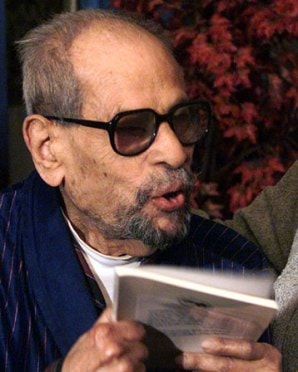Abu Dhabi Film Festival honors Nobel Prize-winning writer
During his life, Egyptian writer Naguib Mahfouz (1911-2006) was famous for two important "firsts": he was the first Arab writer to be awarded the Nobel Prize for Literature (in 1988) and the first Arab writer to devote much effort to cinema.
 |
Writer Naguib Mahfouz |
Attacked by Muslim extremists
In addition, ADFF published a monograph on Mahfouz and cinema, organized exhibitions of film posters and discussions about the writer.
Born in
Mahfouz published his first novel in 1939. From the 1940s onwards, Mahfouz earned his living as a civil servant. He worked in various government departments related to culture and cinema. For a time, he held the position of Chief Film Censor. But from the late 1940s, he began writing scripts and produced more than 25.
By 1994, at the age of 83, he had written more than 30 novels and over 100 short stories. But that same year, he was attacked by two Muslim fanatics with knives when he released his novel.The Children of Gebalawi(The children of Mr. Gaballawi). People said that he “blasphemed God and the Prophet Muhammad” when many characters in the novel “touched” religious figures, such as Allah, the Creator and Almighty, Jesus, Prophet Muhammad, Satan...
In this incident, Mahfouz injured his neck and had to stay in hospital for nearly two months. Since then, he has been severely limited in both his hearing and vision as well as his ability to write, not to mention that his right arm can only work for no more than half an hour a day. In the last years of his life, the writer was almost blind. He suffered a traumatic brain injury in a fall while walking at night. Mahfouz breathed his last at
“The Balzac of Egypt”
Not only are renowned Egyptian directors such as Salah Abou Seif, Youssef Chahine, Hassan Al Imam, Kamal Al Sheikh, Ali Badrakhan and Tawfik Saleh eager to bring his works to the silver screen, but his two novels have also inspired two great Mexican directors, Jorge Fons and Arturo Ripstein. The film schedule at this year’s ADFF also includes the works of these filmmakers, and most of them will be present at the screenings.
Most of Mahfouz's novels have been translated into English and are published by the University of Journalism.
Speaking about the events celebrating Mahfouz at this year’s ADFF, Eissa Saif Al Mazrouei, Director of Special Projects for Culture and Heritage at ADFF, said: “The festival seizes this opportunity to reaffirm the importance of celebrating the art of cinema by introducing examples of cinema history to new audiences today.
Thanks to our collaboration with the Egyptian Ministry of Culture and the Egyptian Cinema Center, we have obtained new subtitled copies of five films selected to be screened at ADFF to mark the 100th anniversary of Mahfouz’s birth. These films, along with other events celebrating Mahfouz at the festival, will give film and book lovers across the UAE the opportunity to enjoy the work of one of the greatest writers of the 20th century, who had a profound impact on both literature and cinema.”
Peter Scarlet, CEO of ADFF, said: “Mahfouz’s depiction of rural life is vivid and incisive, from his early works about Egypt’s ancient past to his later works, which focus on the lives of lower-class people in Cairo, all of which are expressed with a delicate pen. Mahfouz has been described as the Balzac of Egypt.”
(According to TT&VH)






